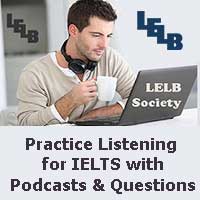IELTS Listening Practice Emotional Intelligence
IELTS Listening Practice Emotional Intelligence
About this activity
- This activity is labeled round table by Dr. Hariri, the creator and administrator of LELB Society.
- This activity is on the premise of Flipped Learning, according to which the students watch a video before the class, carry out research into the selected theme, and prepare themselves for an informed discussion in the class.
- This activity is on the basis of both synchronous and asynchronous computer-mediated communication (CMC), according to which the students are also encouraged to be active even before the class.
- In this flipped classroom activity, the students are encouraged to utilize the comment form at the bottom of the post to to exchange their questions, findings, and experiences with each other. Later on, we will discuss the asynchronous activities in the class. In a few words, “let’s learn from each other.”
About the Video Files
- The video files are meticulously selected among the most prominent academicians, lecturers, and scientists based on Google Scholar.
- We might refer to the exact elapsed time ⌛️ of the video files to pinpoint specific statements, messages, etc.
Writing Activity
- You should adopt a formal register in your written contributions in the comment form.
- To give an answer to a question or comment, use the Reply button.
- In our written activities, we can practice negotiation of meaning (sharing our findings with regard to the selected themes) and negotiation of form (performing peer-reviewed error correction).
- Put a number before your questions in the comment form successively to refer to them more easily in the class.
- Your questions should be unique and not previously raised by your classmates in the comment form.
Expectations
- You should take equal turns in speaking. The maximum amount of time you can have is 60 seconds.
- This is a fully organized activity; consequently, all your contributions, including comments, replies, and verbal opinions, must be with direct reference to the assigned topic and its corresponding video. Any irrelevant contribution is strongly frowned upon.
- You will be stopped if your speech appears to be irrelevant or not supported by evidence.
- Students leaving comments below will be given priority over others in our informed conversations.
IELTS Listening Section
For each of the four parts, you will be given some time to look over the questions and check your answers.
You are given an extra 10 minutes to write down your answers on your answer sheet.
Each of the 40 questions brings you one mark.
For the candidates with physical disabilities, some modifications might be considered, for example, the question items might be available in Braille. However, you should contact your IELTS center and inform them about your special condition in advance.
Instructions for the IELTS Listening Part
In this part of your exam, you will be given some instructions as the following:
- Do not open your question paper until you are told to do so.
- Write your name and your candidate number on the specified space on top of this page.
- Listen closely to the instructions for each part of the paper.
- Write your answers to the questions on the questions paper while you are listening.
- At the end of the test, you will have an extra 10 minutes to transfer your answers to a separate answer sheet. Use a pencil to copy the answers.
Section 1
In this section, you will listen to a conversation between two speakers on an everyday and comment topic, such as organizing events, arranging a trip, talking about the weather, etc. You are supposed to listen closely to get specific factual information.
Section 2
This is a monologue on a general topic, such as public events. Again, you are supposed to listen closely to acquire specific factual information.
Section 3
In this section, you will listen to a discussion between 2 or 4 speakers on an academic topic, such as assignments, taking courses, attending seminars, etc. While focusing on specific factual information, you should also pay attention to the speakers’ attitudes and opinions.
Section 4
In this section, you will listen to a lecture (monologue) on an academic topic. You should focus on specific factual information as well as the main ideas. Also you should pay attention to the speaker’s attitudes and opinions.
You will have around 30 seconds before the test starts to see what kinds of information will be required (for instance, names, dates, times, money, etc.)




11. What does it refer to “prefrontal lobe”?
12. What does it refer to “prefrontal lobe”?
11. What things do help us to manage our emotion and pay attention?
Corrections:
If you want to place emphasis on “help”, the sentence is grammatically correct. However, the sentence should simply read: What things help / can help us … In other words, you don’t need any modal auxiliary verb here unless you want to emphasize something. For more information, refer to my reply to Question 3.
Emotion should be pluralized here to refer to a variety of emotions.
10- What does it take to be emotionally intelligent ?
Hi and welcome to this academic activity.
Corrections:
The question mark is attached to the last word.
9- Does emotional intelligence look different in different places?
8. Do women leaderships contradict the belief that men and women are different in terms of emotional intelligence?
7. How does neuroplasticity make a great contribution to the development of emotional intelligence in children?
6. What is compared to a moral compass?
5. What are the 4 pillars of emotional intelligence?
4. Will our emotional intelligence develop over time?
3. Which country does the highest emotional intelligence have?
Corrections:
Which country has the highest level of emotional intelligence?
hi
excuse me
this sentence is simple present and is not present perfect so i thick helping verb should be dose no has because has is main verb
and also appearance question is simple present so we should use dose and no has
✅ Thank you for raising this question and looking at this grammatical point critically.
This interrogative sentence starts with a WH-question element, which is “which country” here, and “country” plays the role of the “subject” and not the “object” of the sentence. For this reason, you should not use any modal auxiliary verb. Consider the following examples:
Which country does your passport include? (country as the object of the sentence, so you should use a modal auxiliary verb – the principal verb is “have”)
Which country has the highest level of EQ? (country as the subject of the sentence. So, no modal auxiliary is needed – the principal verb is “have”.)
Another example:
How many people died in the accident? (people as the subject of the sentence, no modal auxiliary)
How many people did you see in the accident? (people as the object of the sentence, modal auxiliary verb is required)
Have more questions, please use our comment forms anytime.
Are the two sentence is right? 1. Which boy has a football? 2. Which boys have a football?
Grammatically correct, but semantically weird.
2.What are the differences between emotional intelligence of women and men?
It’s better to say:
… emotional intelligence in women and men
1. What is the meaning of emotional intelligence?